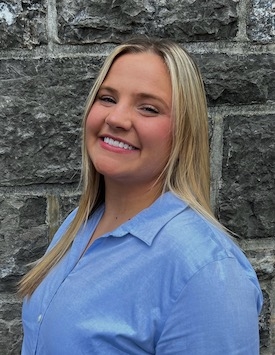Kathleen Hohweiler
IGC FELLOW | Global Change Center
Ph.D. Student • Biological Systems Engineering
Advisor : Dr. Leigh-Anne Krometis
Research Interests: Drinking water quality, contaminants of emerging concern, private drinking water systems, public health
khohwe1@vt.edu

Kathleen is pursuing her PhD in Biological Systems Engineering. Her research is focused on identifying risk factors for the detection of per-polyfluoroalkyl substances (PFAS) in private drinking water systems.
Kathleen graduated with honors from Towson University with a degree in Geology. For several years, she was employed as a research assistant in a hydro-geochemistry laboratory where her work culminated in an undergraduate thesis on the topic of urban stream geochemistry. She also served as an undergraduate researcher in the Towson Political Science Department where she conducted research on civic engagement in Baltimore County Public Schools. In 2019, Kathleen was selected as a USDA REEU summer research fellow where she worked at Virginia Tech on a project quantifying and mapping the presence of heavy metals at a former Superfund site in Pulaski, Virginia.
Kathleen’s current research is the result of a collaboration between the Biological Systems Engineering Department, US Geological Survey, Virginia Household Water Quality Program, and several others. Her work is primarily focused on quantifying the presence of PFAS chemicals at both the point of use and point of entry into the home. Her PhD research will broaden the scope of her master’s work by increasing the number of study counties across Virginia from two to six. She will also begin analyzing any co-occurring relationships between individual PFAS species and other health related contaminants (i.e. lead, E. coli), plumbing types, and socio-economic factors.
Through the IGC program, Kathleen looks forward to future project collaborations with colleagues from other disciplines and broadening her science communication skills to better serve the public.




